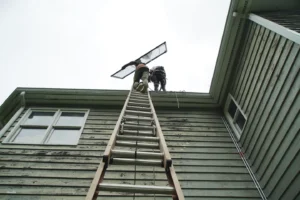Lawmakers Examine Ways to Boost Access to Protective Services for Vulnerable Adults
Bill drafts propose extending court order for emergency services, mandate more reporting to family services agency
- Published In: Politics
- Last Updated: Oct 09, 2023

Rep. Lloyd Larsen (R-Lander) recently spoke to the Joint Judiciary Committee about bill drafts that would require law enforcement to report to the family services department when a vulnerable adult is suspected of being mistreated and extend a court order for protective services from 72 hours to 14 days. (Courtesy photo via Joint Judiciary Committee’s online recording of Sept. 18, 2023 meeting)

By Shen Wu Tan
Special to the Wyoming Truth
Ahead of the legislative session next year, lawmakers are considering strategies to increase access to protective services for vulnerable adults who have been mistreated.
The Joint Judiciary Committee mulled over two proposed drafts of legislation including bill 24LSO-0023 working draft five. It would require law enforcement to notify the Wyoming Department of Family Services (DFS) of reports they receive about vulnerable adults suspected of being or having been “abused, neglected, exploited, intimidated or abandoned” or having committed self-neglect and possibly needing protective services.
“There’s a requirement for the department of family services to report to law enforcement when a vulnerable adult has been suspected of being or has been abused and neglected or exploited,” Rep. Lloyd Larsen (R-Lander), the bill draft’s sponsor, told committee members last month. “It seems logical they would be the same…. This is important, because sometimes law enforcement will get a report that DFS just isn’t aware of, and then later find out there really was a problem. And had they been notified by law enforcement, it perhaps could’ve prevented any further problems.”
The committee voted to reconsider the bill draft during its next meeting in November. Committee members also heard another bill draft sponsored by Larsen that would extend the length of emergency protective services for vulnerable adults.
Bill 24LSO-0021 working draft five states that if a court finds a vulnerable adult has been mistreated or is committing self-neglect, that an emergency exists and “that the vulnerable adult lacks the capacity to consent to the provision of services,” then the court can order protective services on an emergency basis. The order would be to “remove the conditions creating the emergency” and designate authorized services.
As of now, the court order is effective for 72 hours, but the bill draft extends it to 14 days, excluding weekends and holidays. If necessary, the court can add another 30 days to remove the emergency.
“We heard from the agencies that sometimes, particularly in the more rural communities, 72 hours doesn’t allow enough time to get a more permanent solution in place, and therefore, the vulnerable adult sometimes finds themselves back in an unfortunate situation,” Larsen said at the meeting, noting a court order extension would not have a fiscal impact. Under the bill draft, vulnerable adults or their representatives can petition the court to modify or rescind the order at any time.

Sen. Bill Landen (R-Casper), co-chairman of the committee, said he would vote in favor of considering the bill draft at a later date, but he expressed concerns with the proposed extension.
“This individual who is being offered emergency protective services may not be excited about the services being offered, and they may see it as an adverse circumstance at that point,” Landen said. “And it might well be in some respects. That’s why I’m getting a little nervous about extending this from 72 hours all the way to 14 days…”
Another committee member, Sen. Cale Case (R-Lander), added he thinks homeless people are most in need of protective services.
“I don’t know if 14 days is the answer, but I think we need to expand this in a different direction and use this power of the court to address our homeless situation,” he said.
Committee members voted to move the bill draft to their next meeting.
If passed by the legislature, both bills would become effective July 1, 2024. The committee is scheduled to reconvene on Nov. 6 and 7.
The next legislative session starts in February.













